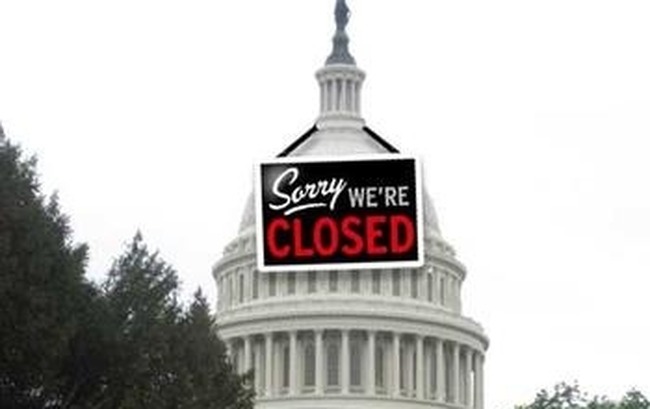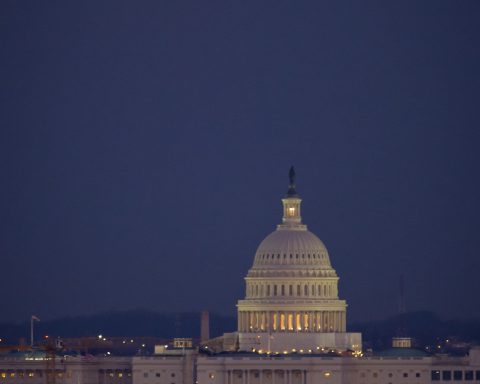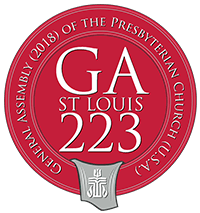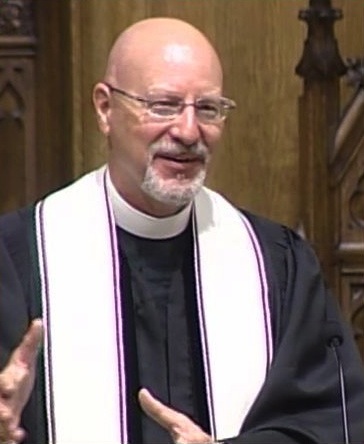Introduction
 This editorial comes on the heels of Election Day 2013, not a day when Senate or House of Representatives seats were in contest, but a day when government “by the people, of the people, and for the people” was honored in city and state races. However, even as the political scene returns to “normal” the use of government shutdown as a tactic is not likely over. The October 1-16, 2013 shutdown recalled its use in 1995-6, and it will certainly be considered again as February 7, 2014 approaches, when a debt ceiling extension will again need approval[i]
This editorial comes on the heels of Election Day 2013, not a day when Senate or House of Representatives seats were in contest, but a day when government “by the people, of the people, and for the people” was honored in city and state races. However, even as the political scene returns to “normal” the use of government shutdown as a tactic is not likely over. The October 1-16, 2013 shutdown recalled its use in 1995-6, and it will certainly be considered again as February 7, 2014 approaches, when a debt ceiling extension will again need approval[i]
Because it is hard to write without partisanship about those whose “rule or ruin” ideology has weakened our society, our editorial is paired with a funeral meditation on the life of William Scranton, former Governor of Pennsylvania and active Presbyterian whose views of governance are a strong counterpoint to some in the Republican Party today. Make no mistake: we honor the service of Mr. Scranton, who was known for his presidential primary run against Barry Goldwater in 1964 and later served on key federal commissions. By posting the fine and warm meditation by Rev. Fred Milligan, we are not trying to enlist Governor Scranton in any positions taken here.
We will refer to a thought of Mr. Scranton’s at the end of this editorial, however, and would direct those interested in a fuller summary of his life to the Pennsylvania Historical & Museum Commission website. One particularly telling quote from that article comes from his service as Ambassador to the United Nations: “Scranton’s ‘speak softly and carry an olive branch’ approach reflected favorably on world opinion of the United States…”
Government Shutdown: Voting for an Unnecessary Evil
Our title refers to the phrase from Revolutionary patriot and agitator Thomas Paine, who wrote in Common Sense that government “is but a necessary evil.” The practices of today’s self-styled revolutionaries take to extremes the long American tradition of distrust of government and should be seen in that light. Historian Garry Wills assesses this oppositional tradition in the book, A Necessary Evil (1999), written partly in response to the 1995 government shutdowns. Our contention here is that Christians (particularly Reformed ones) should be extremely skeptical of government shutdowners and the beliefs they espouse, which are not simply about “Obamacare.”
This editorial will point to (1) sources of more accurate history of our Constitutional arrangements, (2) theological (and General Assembly) grounding for a more positive view of government, and (3) the negative consequences of the October shutdown in relation to the Affordable Care Act. Bottomline: Those who would prevent the government from fulfilling its proper responsibilities violate their pledges to uphold the Constitution. For convenience, we will put the policies of our church that present a more constructive view of government in a separate posting that might be used in adult education or even session discussion.
Bases for Effective Government: On not foundering on the Founders
Garry Wills’ book is notable first for its demolition job on popular myths that distort our understanding of the Constitution and hence of our government: “We interpret the document in terms of concepts and words that are not in the document. Nowhere, for instance, does the Constitution mention checks, or balances, or separation of powers, or co-equal branches (or even branches) of government, or states’ rights…” (57). Starting with the Federalist arguments for a more effective and unified central government than our 13 colonies’ first Articles of Confederation, Wills denies the charge that the Constitution was designed to make governing inefficient or cumbersome, or that its national sovereignty—not absolute power—was ever subordinate to the states. That anti-government ideologues claim faithfulness to the Constitution is thus very ironic, as the Constitution is based on the conviction that government is NOT the problem, to reverse Ronald Reagan’s phrase.
___________________________________________
Those who would prevent the government from fulfilling its proper responsibilities violate their pledges to uphold the Constitution.
___________________________________________
Wills understands the cultural context of anti-governmental views: the nostalgia for local, amateur, spontaneous, populist and other supposedly more authentic forms of leadership.[ii] In his review of A Necessary Evil, political scientist Alan Wolfe proposes that anti-government fears reflect the actual success of US government for much of its history. Wolfe cites the work of Cass Sunstein and Stephen Holmes that shows “that the protection of rights requires strong governmental authority,” logically so to regulate great corporate power for common benefit. Wolfe’s conclusion seems on target:
“Anti-governmentalists claim to speak for freedom and spontaneity, but they are usually incipient authoritarians, their fury directed not at the fact that order is imposed on the world, but on the fact that others besides themselves are imposing the order. They are merely bad losers, and it is out of resentment that they try to bring the whole thing down.” (“A Necessary Good,” The New Republic, 11/1/99)
The idea that government is already broken may gain indirectly from Robert Bellah’s book, The Broken Covenant (1975), which evaluated the promise of the United States at its Bicentennial. His reading was that civil religion was playing out, leaving an external covenant of laws and institutions emptied of moral and communal content. Where there is alienation from or hostility toward the government, it may reflect real defects in the way our system under-protects economic and social rights, even if the wrong powers are blamed for the class divisions that have intensified since Bellah’s writing. Regional demographic and financial imbalances make our current government far less representative and democratic than it should be.
A more recent ethical reading of our governmental adequacy is William F. May’s Testing the National Covenant (2011). May looks carefully at the “fears and appetites” in current American politics in light of the promises and premises of the Constitution. He sees in the Preamble purposes that include the three classical forms of justice: commutative, legal, and distributive justice, the first two of which are more in the body of the Constitution, and the last more in the Amendments. These govern fairness in all exchanges, obligations of the parts to the whole, and obligations of the whole to the parts. He draws his overall understanding of the “gifts and tasks” of the covenant from scripture and the Calvinist Legacy that deeply influenced the founding fathers.
___________________________________________
That anti-government ideologues claim faithfulness to the Constitution is thus very ironic, as the Constitution is based on the conviction that government is NOT the problem, to reverse Ronald Reagan’s phrase.
___________________________________________
May notes that the Constitution puts final sovereignty with the people, not the states, and seeks a “more perfect union.” He summarizes: “The goals of justice, domestic tranquility, common defense, general welfare, and the blessings of liberty constitute the original covenant, the moral vector of the nation” (102). To justify shutting down government, in light of this analysis, one would need to show that one or more of these major goals was being obstructed.
Where does a positive vision of government come from?
The best set of perspectives on Reformed thinking about governance remains the book Reformed Faith and Politics, edited by Ronald H. Stone, and presented to the Presbyterian General Assembly in 1983, along with a social witness policy statement of the same title. In his introduction, Stone identifies particular historical contributions of the Reformed ethos – such as the influence of John Witherspoon on James Madison – and addresses the ways the Protestant understanding of sin fueled their opposition to absolutism:
The political order, though, as the central coordinating order of society, has particularly awesome responsibilities in securing a reasonable approximation of justice. Pure justice in either its philosophical expression or in terms of total equity is unattainable in history. God’s love, however, requires the constant struggle for justice and the removal of those who in their roles as public servants impede justice (19).
The corresponding policy statement, adopted by the 1983 Assembly, echoes Calvin’s high estimate of the vocation of civil magistrate:
Discipleship is not only a personal, individual calling. The sovereign Lord works not only in the depths of individual souls but also in the organizations, the institutions, and the movements of human history…. All Presbyterians, therefore, have a political vocation. Beyond the general political vocation of citizenship there is the special political vocation of public office. Public officials are not to be despised but to be honored and to be challenged when they do wrong. We must be sure that the worthy calling of public service is not ignored or demeaned. To be realistic about politics is not to despise it but to learn how to use it as an instrument of justice. (Minutes, 1983, Part I, pp. 776?78)
In the many statements by the General Assemblies in the period between 1910 and 1945, there are countless affirmations of democracy and an expansive view of government’s responsibilities to improve human welfare and fight tyranny. The Great Depression drew many strong testimonies (1936 in particular—see supplement), as did the two bloody world wars. It is safe to say that the expanding roles of government through the sixties would have made government shutdown thinking only the preserve of those profoundly opposed to Federal civil rights enforcement, although there was certainly civil disobedience undertaken against Jim Crow laws and the Viet Nam war.
Jumping ahead to 2008, the General Assembly adopted a resolution based on a study of voting rights, Lift Every Voice. This policy includes an updating of Reformed thinking on democracy and the capacities of government. Two excerpts are provided in our summary, one addressing accountability and the principles of equality and liberty against paralysis by poverty and fear, and the other warning against claims of purity or self-righteousness.
___________________________________________
“Pure justice in either its philosophical expression or in terms of total equity is unattainable in history. God’s love, however, requires the constant struggle for justice and the removal of those who in their roles as public servants impede justice.” – Ron Stone
___________________________________________
Clearly, the government shutdown episode goes beyond gridlock to literal paralysis, and the partisanship behind it left even many Republicans out.. The final section of Lift Every Voice invokes Calvin’s Third Use of the Law, a Reformed theological concept that undergirds precisely such legislation as the Affordable Care Act, with its positive intent and requirement of participation. A government of laws, in this view, does not simply punish evildoers and restore order, but provides positive goods and structures – practices that enrich the commonwealth for all. As the 2008 policy states:
Democracy itself can be mean, if the voters and the choices before them are mean, although we suspect that such a democracy would soon leave too many people out. Popular leaders and parties can promote irresponsible ideas, ignore dangers, burden future generations. Good laws are essential but not sufficient; enforcement requires a belief that government itself should serve “the people.”
In 2012, the General Assembly adopted a report, World of Hurt, Word of Life, which contains a model of economic reconstruction based on the view that self-government is not self-ish government but should be institutionally creative. Our supplement excerpts its high view of government.
The Consequences of the Shutdown for the “Common Good”
The shutdown was part of a last-ditch effort to prevent the extension of medical benefits by private insurers to a greater number of poorer US citizens through mandates for more adequate insurance policies and broader availability due to subsidies, paid for by higher taxes on the wealthy and parts of the medical establishment. It is well known that Americans pay far more per capita for medical care but that its distribution mirrors our income inequality: over 48 million Americans have no health insurance, and others pay exorbitant amounts for very limited coverage. The Affordable Care Act (ACA), tagged Obamacare, is intended to improve healthcare availability and make this enormous sector of our economy (16%) more efficient as well as compassionate.
 The ACA has been partially blocked in states with Republican legislatures and governors, leaving some of their own residents unable to benefit from the program (or able to participate but with greater difficulty). The roll-out of the program in some places has been marred by computer malfunctions, which have led to the extension of its registration process and much political criticism. The shutdown involved much mischaracterization of the program and some hampering of its promotion, but did not de-rail the ACA, which had already survived Supreme Court challenge. The 14 states that implement their own insurance exchanges have had generally positive experiences so far.
The ACA has been partially blocked in states with Republican legislatures and governors, leaving some of their own residents unable to benefit from the program (or able to participate but with greater difficulty). The roll-out of the program in some places has been marred by computer malfunctions, which have led to the extension of its registration process and much political criticism. The shutdown involved much mischaracterization of the program and some hampering of its promotion, but did not de-rail the ACA, which had already survived Supreme Court challenge. The 14 states that implement their own insurance exchanges have had generally positive experiences so far.
The shutdown cost the US government an estimated $24 billion in added interest costs, foregone taxes, decreased purchasing and growth, continued high levels of unemployment, etc.) The downgrading of US creditworthiness will cost additional money over time and renewed calls for the dollar to be replaced as international currency, which would cost yet more. The damage to the reputation of the United States and its system of government is harder to assess, but widely reported.
___________________________________________
The claim of principle, or right, without responsibility seems to be the base of the matter. The Reformed understanding of “gift and task,” of justification and sanctification, of grace received and gratitude enacted for the whole community all seem missing.
___________________________________________
Yet the impact on the legislators themselves who tried to force the President and the Democratic-controlled Senate to undo Obamacare by threatening government shutdown is said to be limited politically. Many are in districts with secure Republican majorities. Others count on Americans simply blaming all politicians for not compromising. The game of chicken over the debt ceiling has made some already cynical about the political system, and the frequent use of the filibuster to block perfectly qualified Federal nominees adds to that perception. Further, a politicized Supreme Court’s dismantling of even limited campaign finance limits in 2010’s Citizens v. FEC case ensures continued funding to many of the most strident shutdown leaders.
In light of the tradition and policy base of the Presbyterian Church (U.S.A.), however, the attempted use of the purse strings as a garotte on government functioning must be judged an exercise in self-righteousness and arrogance. Without arguing that healthcare is a right (affirmed by many churches), the legislators felt that they had a different set of rights or entitlements: to take away many things that other people depend upon and to change the rules on an already-enacted law. Their actions included the patronizing and hypocritical moral claim that they know what is better for the uninsured citizens, while they themselves have secure health insurance. Their alternatives to the ACA generally meant returning citizens to an even harsher “free market,” which will inevitably leave out those without market power or effective access.
The form the moral claim took was to invoke the principle that government should not do more – or tax more – for a new form of government assistance to expand and improve the healthcare marketplace. Some point out that no such principles seemed to block the Bush expansion of prescription medicine benefits (Medicare Part D) or the prosecution of two wars, all without sufficient taxation, resulting in the explosion of the deficit that is now finally declining. Others feel that no principle can explain these lawmakers’ persistent opposition to any initiatives by President Obama: racism is the suggested ulterior motivation.
___________________________________________
Protecting the privileges of those who already have healthcare is not governance, and nor is taking down as many government functions as possible to block one new law, however significant.
___________________________________________
But the claim of principle, or right, without responsibility seems to be the base of the matter. The Reformed understanding of “gift and task,” of justification and sanctification, of grace received and gratitude enacted for the whole community all seem missing. The fundamental Reformed belief that government should serve the whole people is disregarded; the market is to be given roles of governance it has never adequately served. Protecting the privileges of those who already have healthcare is not governance, and nor is taking down as many government functions as possible to block one new law, however significant. Government shutdown politics threatens to reduce government simply to the extension of class war and self-interest.
And this is perhaps where William Scranton’s funeral ceremony contained that idiosyncratic rather than ideological twist. In his plans for his funeral service, even in the Lord’s Prayer, Mr. Scranton asked that the word, “kingdom,” be given a less monarchic substitute. That’s a pretty big request, but he clearly felt that God wouldn’t mind a little more democracy. And Rev. Milligan didn’t shut down that idea, but used the word, “governance.”
*****
Read the funeral meditation for William W. Scranton.
See compilation of PC(USA) Social Witness Policy relevant to the shutdown.
[i] Under House Speaker Newt Gingrich, the government was shutdown from October 13-16, 1995 and again from December 15, 1995-January 8, 1996. There were earlier “funding gaps” in the 1970’s and 1980’s, more limited in their impact.
[ii] Wills’ book, Cincinnatus (1984), explores some of the early ways governmental authority is presented in the images of George Washington as the noble Roman general who returned to his plow after victory.






Unbound Social